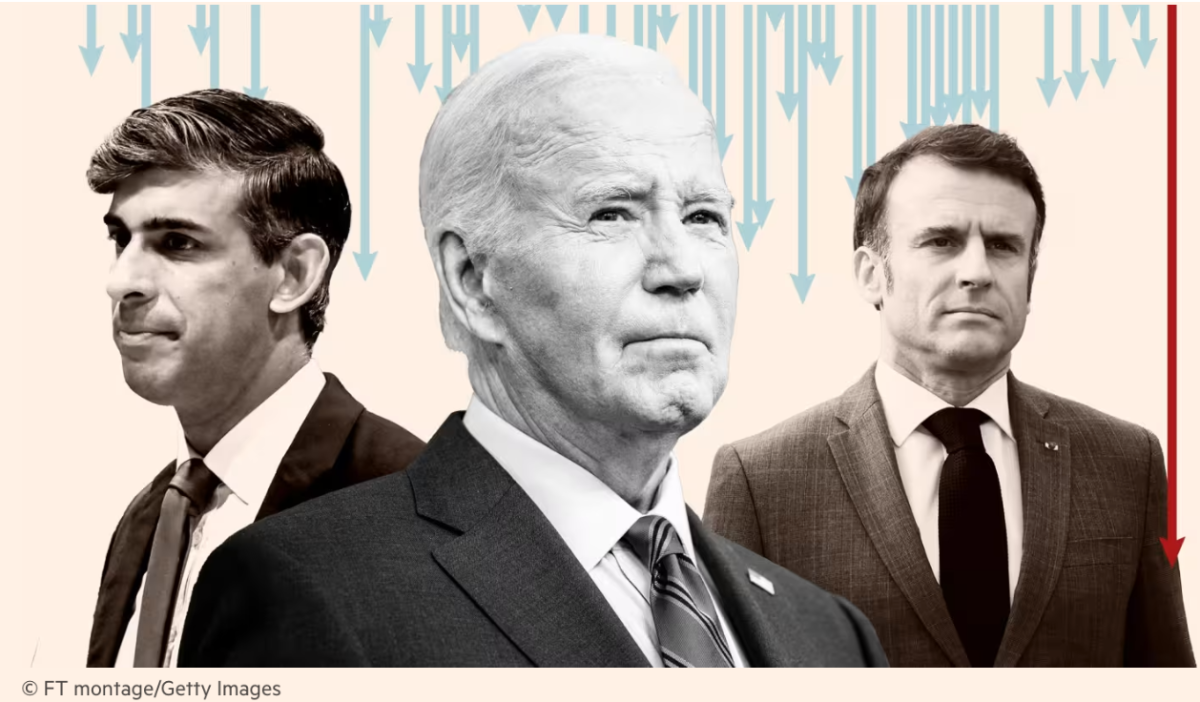Since the COVID-19 pandemic hit in 2020 causing a variety of long-term effects, voters in Western democracies have removed incumbents (the politicians/political parties currently holding office prior to the election) from power in a staggering 74% of elections (40 out of 54). This anti-incumbent fervor has been apparent for a few years across the political spectrum. Furthermore, an election-heavy 2024, in which about half of the world’s population went to the polls in over 70 countries, confirmed that it wasn’t just an anomaly. In fact, the trend has gained even more traction, with 2024 being the first year in the history of the ParlGov survey (which began in 1905) that every single incumbent party in a developed country lost vote share compared to their previous election, even those that bucked the overall pattern to emerge victorious. But what explains such unprecedented universal discontent with those in power?
Inflation and Cost of Living: Many political trends can be summed up by the legendary saying of political strategist James Carville, “It’s the economy, stupid.” During the aftermath of the COVID-19 pandemic in 2022, the global inflation rate hit 7.97%, the highest rate since 2008. While inflation slowed in 2023, it still remained relatively high at 5.69%, the third-highest figure since 1996. Prior to the pandemic, the global economy had been enjoying an unprecedented stretch of low inflation, with the rate staying below 2.5% from 2014 to 2020. This inflation problem, combined with price increases in the housing market, forced citizens worldwide to cut back on their spending. In a 2022 survey, 88% of Africans, 84% of Middle Eastern/North Africans, 83% of North/South Americans, 82% of Europeans, and 75% of Asian/Oceanians reported that they planned to or had already reduced their expenses. Such long-lasting economic malaise allowed opposition politicians to gain popularity, seizing on an economic vision nostalgic for the relative stability of 2019.
Immigration: Increasing immigration in Western countries has also been a factor of opposition to incumbents, fueling housing crises, disinformation, and voter anxiety. Irregular immigration increased by 172% in Europe, and the number of undocumented immigrants in the United States increased by 8% compared to 2019. Legal immigration also increased by 23% and 3% in each region respectively during the same time period. Several parties that ran on hardline anti-immigration platforms experienced some of their best ever electoral performances. These parties support policies once considered outside the mainstream, including increasing border checks (something which is unusual in the European Union’s Schengen Area), strict limits on migration, and sometimes mass deportations. Though many did not end up being a part of the governing coalitions formed following the elections, far-right anti-immigrant parties in the United Kingdom (14% vote share), Portugal (18.1%), Austria (29%), and France (33.21%), among others, found immense success in national elections. They also achieved success at the state level in Germany–where a far-right party won a state election for the first time since World War II–and in the elections for European Parliament, and candidates who embraced hardline immigration policies also performed well in the United States.
Anti-Elitism: Anti-establishment mood has come to be a dominating factor in recent elections prior to 2024, but it has risen further since 2022. Among a group surveyed in late 2023, with the mega election year of 2024 on the horizon, 58% and 57% believed their country was in decline and that their nation’s society was broken, respectively. Moreover, 63% expressed desire for a strong leader (generally associated with populism) who would wrest power away from wealthy and powerful elites. Additionally, 62% of respondents said that they thought of elites as closely connected with similar goals and views and as acting with selfish intent. From these responses, it is clear that mistrust of elites (generally associated with incumbency) was part of the reason behind an embrace of opposition-led populism in 2024.
These issues, while not the only ones facing the world, have been the major reason behind the anti-incumbent sentiment that has been brewing globally for years. With 2025 now underway, the question facing the world now is whether these newly-elected governments experience any success, or whether support for parties in the opposition maintain primacy for yet another global election cycle.
Sources: Associated Press (1), NBC News (2), Macrotrends (3), Worldwide Independent Network of Market Research and Opinion Poll (4), Pew Research Center (5, 6), The Guardian (7), European Commission (8), USA Facts (9), Ipsos (10)







